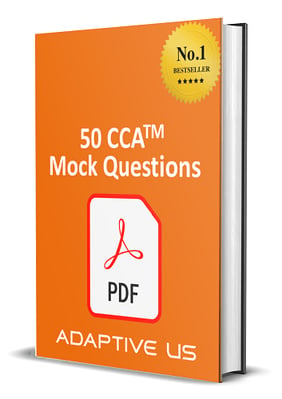IIBA CCA Mock Questions
(Answers after the questions section)
Q1: Analyst B has discovered unauthorized access to data. What has she discovered?
- Breach
- Hacker
- Threat
- Ransomware
Q2: Analyst B has discovered multiple attempts from unauthorized users to access confidential data. This is most likely?
- Admin
- Hacker
- User
- IT Support
Q3: Analyst B has discovered multiple sources which can harm the organization’s systems. What has she discovered?
- Breach
- Hacker
- Threat
- Ransomware
Q4: An internet-based organization whose address is not known has attempted to acquire personal identification details such as usernames and passwords by creating a fake website. This is an example of?
- Breach
- Phishing
- Threat
- Ransomware
Q5: One of the employees of the organization has obtained a loan by using another employee’s salary documents. This is an example of?
- Identity threat
- Threat
- Exploit
- Ransomware
Q6: Among the following, which task is not a usual expectation from the cybersecurity analyst?
- Understand the importance of cybersecurity
- Understand risks of cyber-attacks, identity and data theft, loss or disruption of services, communication, systems, and infrastructure
- Follow industry-wide standards and practices to minimize risk
- Take periodic back-up of data for the organization
Q7: What is the likely cost of cyber threats annually by 2021?
- 1 Trillion
- 3 Trillion
- 6 Trillion
- 12 Trillion
Q8: Architecture, that defines the business strategy, governance, organization, and key business processes, is known as?
- Business architecture
- Data architecture
- Application architecture
- Technology architecture
Q9: Architecture, which provides a blueprint for individual application systems to be deployed, their interactions, and their relationships to core business processes of an organization, is known as?
- Business architecture
- Data architecture
- Application architecture
- Technology architecture
Q10: Architecture that is across all of these elements of architecture that tries to protect the organization’s information and operations is known as?
- Business architecture
- Security architecture
- Application architecture
- Technology architecture
Q11: Which server handles application requests from a client with an HTTP interface to move, receive and send information?
- File Server
- Directory Server
- Web Server
- Application Server
Q12: Which server handles processing logic on data received from client and from database and applies programming logic rules to data?
- File Server
- Directory Server
- Web Server
- Application Server
Q13: Which server stores and retrieves information and optimizes storage of information in a defined folder structure?
- File Server
- Directory Server
- Web Server
- Application Server
Q14: Which layers of internet communication mostly concern themselves with moving data around?
- Upper
- Lower
- External
- Internal
Q15: Which approach assumes majority of planning is completed before construction is initiated?
- Waterfall
- Agile
- Scrum
- Hybrid
Q16: Which element of the following is not a part of ITIL?
- Service strategy
- Service design
- Service transition
- Service selling
Q17: Protection of computer networks and data from various electronic and digital threats is known as?
- Cyber Security
- Data Security
- Network Security
- Server Security
Q18: Protection of organization’s data from threats is known as?
- Cyber Security
- Data Security
- Network Security
- Server Security
Q19: Charter as a deliverable is of utmost interest to?
- Leadership
- Business
- Enablers
- IT Operations
Q20: Security requirements as a deliverable are of utmost interest to which stakeholder group?
- Leadership
- Business
- Enablers
- Marketing
Q21: Solution requirements as a deliverable is of utmost interest to
- Leadership
- Business
- Enablers
- IT Operations
Q22: Application support is typically the primary responsibility of which stakeholder group?
- Leadership
- Business
- Enablers
- IT Operations
Q23: A steering committee is typically a part of which stakeholder group?
- Leadership
- Business
- Enablers
- IT Operations
Q24: Enterprise-level threat assessment is typically the key responsibility of which stakeholder group?
- Leadership
- Business
- Enablers
- IT Operations
Q25: A framework containing security policies, approach, tools and awareness programs for achieving the organization’s security objectives is know as?
- Cyber Security
- Security Policy
- CIA Triad
- Security Governance

